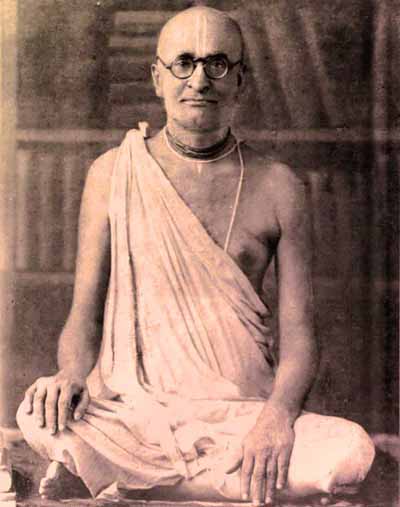śrī śrī guru gaurāṅga jayataḥ!

Year-3 & 16, Issue 6
Posted: 1 July, 2010 & 7 July 2023
Dedicated to
nitya-līlā praviṣṭa oṁ viṣṇupāda
Śrī Śrīmad Bhakti Prajñāna Keśava Gosvāmī Mahārāja
Inspired by and under the guidance of
Śrī Śrīmad Bhaktivedānta Nārāyaṇa Gosvāmī Mahārāja
We Are Not the Substance –
We Are Potency
by Śrīla Bhaktisiddhānta Sarasvatī Ṭhākura Prabhupāda

We are not the substance – we are potency. The position of the jīva is that he is a part of the taṭasthā-śakti (marginal potency) who can enjoy the material energy, who can cease to enjoy it, and who can go back to his original position. Situated in the devotional mood, he can offer his services to the Absolute instead of collecting servants from this world which is the plight of the deceptive brain. That enjoying mood is but bait and a trap and will not lead us to the Absolute. Determining the true self will lead us there.
We should first realize this: we are in need of receiving the divine boon, our own boon, of the self. As we are now in the human frame, we have the opportunity to know the fact of transcendence. Inanimate beings are not known as sentient. They are deprived of the faculty of comprehending transcendental sound vibration. We cannot even communicate with them about their future needs. But since we have got a human life, we are in a condition that allows us to hear, through the medium of transcendental sound, a perfect answer to our desire to obtain the highest thing one could possibly crave.
Through our perceptual activity, we have experienced our finitude in previous births as well as in this one. We have come across so many things and we have come to the conclusion that we should seek the best thing. And in order to do so we are called upon to pay sufficient attention to our own property, our eternal property. This calling is based upon the opportunity offered to us by our present human frame.
When we think that we are conditioned souls, we always look at the outer side of our existence – that is, the external body we have – and then we come to inspect the inner aspect which we call our astral body. Both of these come and go, and so have no eternal references associated with us. But as our souls are eternal, we cannot consider the insubstantial external body or the transient internal body to be identical with the soul. They are incorporated later on by abuse of our independent will. When we abuse that free will, or when we show our diffidence towards serving the Absolute, the Over-soul, we think we are entitled to dominate nature and natural phenomena. But these things, so to say, have only a temporary level of existence. The eternal self should never be considered identical to the mind, who is but an agent of the soul and designed to meddle temporarily with the external world.
We must not become confused by the simile of the breaking of the jar being like the dissolution of the material body,* and we should not come to the conclusion that we have no other destination but to be absolutely identical with the Over-soul, for that is not the case. We are actually measurable cavities, like the hollow space within the jar. Simply by breaking the external frame, we should not think that we will be turned immeasurable. We are decidedly, always measurable things. This measurement, or the very platform of finitude, is quite sufficient for us not to consider ourselves to be the Over-soul. The finite being should never think that an instance of finitude can claim to be the infinite. Hence, Śrī Kṛṣṇa Caitanya has told us that in the core of your being, you are none other than a Karsna (worshiper of Lord Kṛṣṇa), or a Vaiṣṇava (worshiper of Lord Viṣṇu). You have no other eternal function than to serve Śrī Kṛṣṇa.
_____________________
* The air contained within a jar mixes with the totality of air when the jar breaks.
We require a solution for the various problems of our life, but we are susceptible to interruptions and troubled by foreign relations wherein we must potentially meet and discuss different contending ideas and thoughts from outside. So we require divine instruction for our purpose. We are assured by the hymn sung by the Supreme Lord Śrī Kṛṣṇa:
sarva-dharmān parityajya
mām ekaṁ śaraṇaṁ vraja
ahaṁ tvāṁ sarva-pāpebhyo
mokṣayiṣyāmi mā śucaḥ
Bhagavad-gītā (18.66)
The essence of this declaration is “Depend on Me. You will not have to repent for such submission. Whatever you have acquired up to this time, leave aside and come up to Me. I will dictate to you what course you should adopt.”
Adapted from The Gaudiya Volume 26, Number 10
by the Rays of The Harmonist team